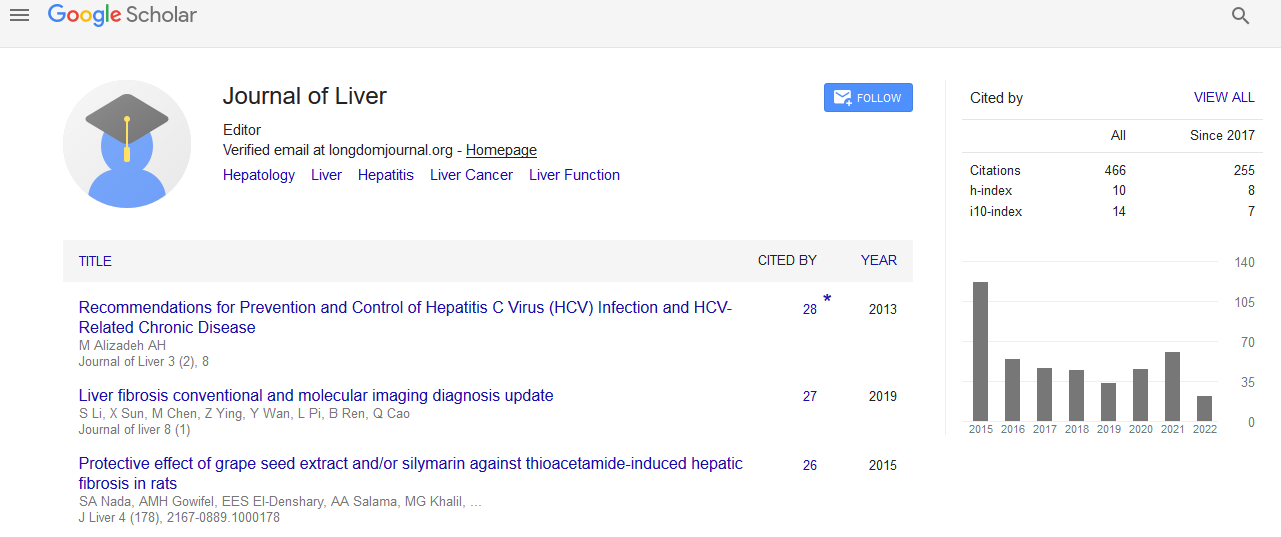PMC/PubMed Indexed Articles
Indexed In
- Open J Gate
- Genamics JournalSeek
- Academic Keys
- RefSeek
- Hamdard University
- EBSCO A-Z
- OCLC- WorldCat
- Publons
- Geneva Foundation for Medical Education and Research
- Google Scholar
Useful Links
Share This Page
Journal Flyer

Open Access Journals
- Agri and Aquaculture
- Biochemistry
- Bioinformatics & Systems Biology
- Business & Management
- Chemistry
- Clinical Sciences
- Engineering
- Food & Nutrition
- General Science
- Genetics & Molecular Biology
- Immunology & Microbiology
- Medical Sciences
- Neuroscience & Psychology
- Nursing & Health Care
- Pharmaceutical Sciences
Double-balloon colonoscopy: Experience from a tertiary care center
3rd World Liver Congress
December 17-18, 2018 Abu Dhabi, UAE
Ali Al Hassani, Zahid M A, Koulaozidis A, Plevris J N and Trimble K
Tawam Hospital, UAE
Scientific Tracks Abstracts: J Liver
Abstract:
Introduction & Aim: The failure rate of cecal intubation with conventional colonoscopy is 5% to 10%. Double-Balloon
Endoscopy (DBE) is a new technique for antegrade or retrograde examination of the small intestine with a flexible scope and
a sliding over tube with a balloon at the distal end of both. The entire colon can be shortened and evaluated by the push-andpull
technique, which allows diagnostic and therapeutic interventions (e.g. biopsies). The aim of this study was to evaluate the utility
of the double balloon enteroscope used for complete examination of the colon in patients with incomplete standard colonoscopy.
Method: This is a retrospective single-center case series from one large tertiary care center. All the patients who had DBC
from December 2008 to December 2012 were included in the study. The medical records of these patients were reviewed
retrospectively for details regarding indication, patient characteristics and data from the initial colonoscopy, pathological
findings, therapeutic procedures and post-procedure complications.
Result: There were total of 31 patients (19 women and 12 men; mean age, 60 years, range 20-89). Common indications to the
procedure included obscure GI bleeding/anemia (22.5%), previous abnormal imaging or capsule endoscopy (16.1%), known
or suspected polyps (19.3%) and IBD assessment or surveillance (19.3%). 11/36 (30.5%) patients had previous history of
abdominal or pelvis surgeries. 50% of patients had at least 1 while 36% patients had two or more than two prior colonoscopies.
Reasons for previously failed procedures included patient discomfort (25%), excessive looping (19.4%), bowel redundancy
(19.4%) and fixed angulated colon (13.8%). Complete colonic examination was achieved in 97% of the patients (30/31). The
sedation was similar to conventional colonoscopy (mean Midazolam dose 3.15 mg; range 0-8, mean Fentanyl dose 73 mcg;
range 0-150 mcg). 11% patients had no pain, 22% minimal and 50% mild pain. 16 patients (44%) had significant pathology
mostly (93%) beyond the extent of the previously incomplete colonoscopy. No complications were noted in this study.
Conclusion: Double-Balloon Colonoscopy (DBC) is highly effective for complete colonic and distal small bowel evaluation in
patients with previously incomplete colonoscopy. It is especially useful in patients with difficult colonic anatomy or previous
abdominal surgeries and can be performed with the patient under conscious sedation with quite reasonable success. A
prospective control study is recommended to prove these findings.
Discussion: Despite advances in endoscopy techniques, total colonoscopy still fails in some patients. Balloon endoscopy is
an effective tool for investigating the small intestine. A retrograde approach might facilitate successful total colonoscopy and
allow endoscopic therapy in patients who had incomplete colonoscopy with a conventional colonoscope. The importance of
total colonoscopy is well recognized, especially for older patients because of the increase in right-sided colon cancer with age.
Indeed, DBC detected advanced colon cancer in this study which was inaccessible to conventional colonoscopy. In addition,
we performed all procedures without any sedatives or complications.
Biography :
Zahid M A is a Consultant Gastroenterologist at Tawam Hospital, Al Ain. His main interests include the management of Inflammatory Bowel Disease (IBD) with a focus on novel biological therapies and advanced endoscopy. He has completed his graduation in Medical Training from University of Health Sciences, Pakistan. He has completed his Gastroenterology training from the Centre for Liver and Digestive Diseases and Scottish Liver Transplant Unit at Edinburgh Royal Infirmary and Western General Hospital in Edinburgh. He has interest in the field of IBD and has worked as the Clinical Lead for Management of IBD within the NHS Fife, Scotland. He has been Faculty for Endoscopy training at Victoria Hospital, Kirkcaldy. One of his key interests includes capsule endoscopy double balloon endoscopy.
E-mail: mazahid@seha.ae

